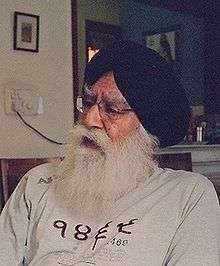J. P. S. Uberoi
| Jit Pal Singh Uberoi | |
|---|---|
 J.P.S. Uberoi in September 2012 |
J. P. S. Uberoi (Jit Pal Singh Uberoi; born 1934) is an Indian sociologist and philosophical anthropologist. He retired as a Professor of Sociology at the Delhi School of Economics, New Delhi, India. He is best known for establishing an alternative paradigm in the Indian social sciences, which inaugurates the space for a non-western reading of the 'West' and paves the way for a history and an anthropology of science and European modernity.[1] In the year 2011, the Indian Sociological Society honored him with the Life Time Achievement Award.[2]
Education and Research
Uberoi was educated at the University College London as an engineer in the 1950s. He subsequently graduated from the University of Manchester with a degree in anthropology where he was taught among others by the anthropologist Max Gluckman. His graduate work at Manchester culminated in the publication of his first book Politics of the Kula Ring: An Analysis of the Findings of Bronislaw Malinowski (Manchester University Press) in 1962. He completed his Ph.D. in 1964 in the Department of Anthropology at the Australian National University. His doctoral work was based on Afghanistan and the Ph.D. dissertation was titled Social Organisation of the Tajiks of Andarab Valley, Afghanistan. He came back to India in the late 1960s and started a decades-long career of teaching and research at the Delhi University. His students who have become notable anthropologists include Deepak Mehta, Harish Naraindas, Savyasaachi and Felix Padel among others.
Books
- Politics of the Kula Ring: An Analysis of the Findings of Bronislaw Malinowski (1962, Manchester University Press)
- Science and Culture (1978, Oxford University Press)
- The other mind of Europe : Goethe as a Scientist (1984, Oxford University Press)
- Religion, civil society, and the state : a study of Sikhism (1996, Oxford University Press)
- The European Modernity: Science, Truth, and Method (2002, Oxford University Press)